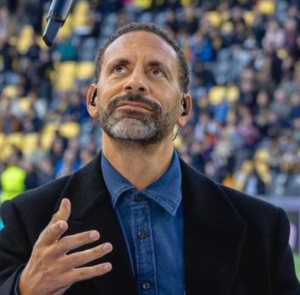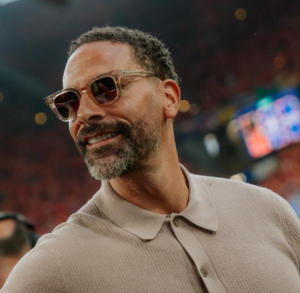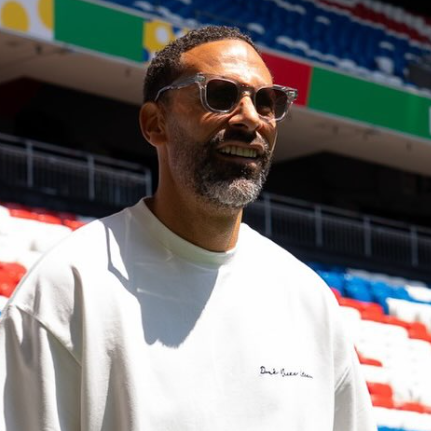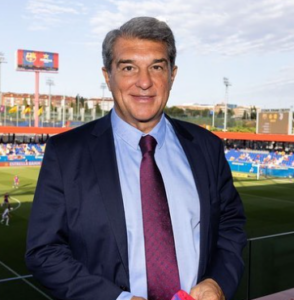Rio Ferdinand’s journey from a nightlife enthusiast to a disciplined professional is a testament to the transformative power of strong leadership
Under Sir Alex Ferguson’s watchful eye, Ferdinand grew into a player who defined an era of success at Manchester United.
Their story serves as a reminder of what it takes to succeed at the highest level: talent, discipline, and the willingness to learn. For Ferdinand, Ferguson’s timely intervention wasn’t just about curbing bad habits; it was about unlocking greatness.
Today, as Ferdinand reflects on his career, he does so with a deep appreciation for the manager who believed in him—and wasn’t afraid to call him out when it mattered most.
Table of Contents
Rio Ferdinand: Sir Alex Ferguson’s Methodology
A Guiding Hand for Him
Manchester United’s legendary manager, Sir Alex Ferguson, was renowned not only for his tactical brilliance but also for his ability to shape the careers of his players.1
One notable example is Rio Ferdinand, who faced a critical juncture early in his United career. The former defender recently opened up about how Ferguson’s guidance helped him shed his partying habits and focus on becoming one of the best defenders in football history.
In the summer of 2002, Rio Ferdinand joined Manchester United from Leeds United for a record-breaking £18 million fee. The transfer made headlines, marking Ferdinand as one of the most promising defenders of his generation.
However, his dream start at Old Trafford was interrupted when he picked up an injury in a pre-season friendly, sidelining him for six weeks.
This downtime led to a testing period for Ferdinand, who used the time off to indulge in Manchester’s nightlife.
What seemed like harmless fun soon became a matter of concern for Sir Alex Ferguson.
INEOS need to be as brutal with the players…
Ashworth departs! #ManchesterUnited pic.twitter.com/c7oa0vznZz
— Rio Ferdinand (@rioferdy5) December 9, 2024
Partying vs. Professionalism: Ferdinand’s Early Missteps
Ferdinand’s admission paints a picture of a young player caught between two worlds: the freedom of youth and the discipline demanded by top-flight football. He revealed on his podcast, Rio Ferdinand Presents, that his early days at United were marred by late nights and excessive partying.
“I went out every night. I wanted to see what the atmosphere was like, what the vibes were like,” Ferdinand admitted.
This carefree attitude didn’t sit well with Ferguson, who was known for his no-nonsense approach to player discipline. The Scotsman wasn’t one to let talent go to waste, and he was prepared to intervene when needed.

Rio Ferdinand: Sir Alex’s Warning
Ferguson’s intervention came in the form of a simple but stern warning.2
Ferdinand recalled the conversation vividly:
“The manager found out and slowed me down with one comment: ‘You want to stay here? You better watch what you do.’”
This statement struck a chord with Ferdinand. It wasn’t just a critique but a challenge—an invitation to align himself with the standards of a club that thrived on excellence and discipline.

Learning from the United Greats
Ferdinand didn’t just take Ferguson’s words to heart; he also learned from the actions of his teammates. Training alongside the likes of Gary Neville, Paul Scholes, Roy Keane, and Ruud van Nistelrooy, Ferdinand noticed a stark difference in their approach to the game.
“These guys weren’t going out, and the sessions were sharp every day,” Ferdinand said. “I had to curb that and become much more professional.”
This realization marked the beginning of a transformation. Ferdinand started to emulate the dedication of his teammates, understanding that success at Manchester United required more than just natural talent.
The Rise of a Manchester United Legend
Once Ferdinand committed to a more disciplined lifestyle, his career trajectory soared. His performances on the pitch improved, and he quickly became an integral part of Manchester United’s defense.
Over the next decade, Ferdinand cemented his legacy as one of the best defenders in Premier League history.
His accolades at United speak volumes: six Premier League titles, one UEFA Champions League title, one FIFA Club World Cup, and numerous domestic trophies.
Ferdinand’s ability to adapt and grow under Ferguson’s mentorship was instrumental in these achievements.

Rio Ferdinand’s Legacy of Player Development
Ferdinand’s story is one of many that illustrate Sir Alex Ferguson’s genius as a manager.3
Beyond tactics and matchday strategies, Ferguson excelled at man-management. He had an uncanny ability to identify potential pitfalls in his players’ careers and guide them back on track.
Whether it was a young Cristiano Ronaldo’s tendency to overplay or Eric Cantona’s fiery temperament, Ferguson consistently found ways to bring out the best in his players. His approach wasn’t about strict control but about fostering self-discipline and accountability.
The Impact of Discipline on Football Success
Ferdinand’s transformation under Ferguson underscores a broader truth about professional football: talent alone isn’t enough. The sport demands discipline, mental toughness, and a relentless work ethic.
Players who fail to adapt to these demands often fade into obscurity, regardless of their initial promise. On the other hand, those who embrace the grind—like Ferdinand did—set themselves apart as legends of the game.
For young footballers, Ferdinand’s story serves as a valuable lesson. It highlights the importance of listening to constructive criticism and being willing to change. More importantly, it emphasizes the role of mentorship in personal and professional growth.
Sir Alex Ferguson’s ability to guide Ferdinand toward maturity is a testament to the impact a great coach can have. Aspiring athletes should seek out mentors who not only believe in their potential but also challenge them to reach it.

Also Read: Gina Rodriguez Weight Loss: Truth Behind Her Transformation, What Happened To Her? And Health Update
Also Read: Karim Benzema (Footballer): Who Is He? Bio, Wiki, Age, Career, Net Worth 2024 and More






